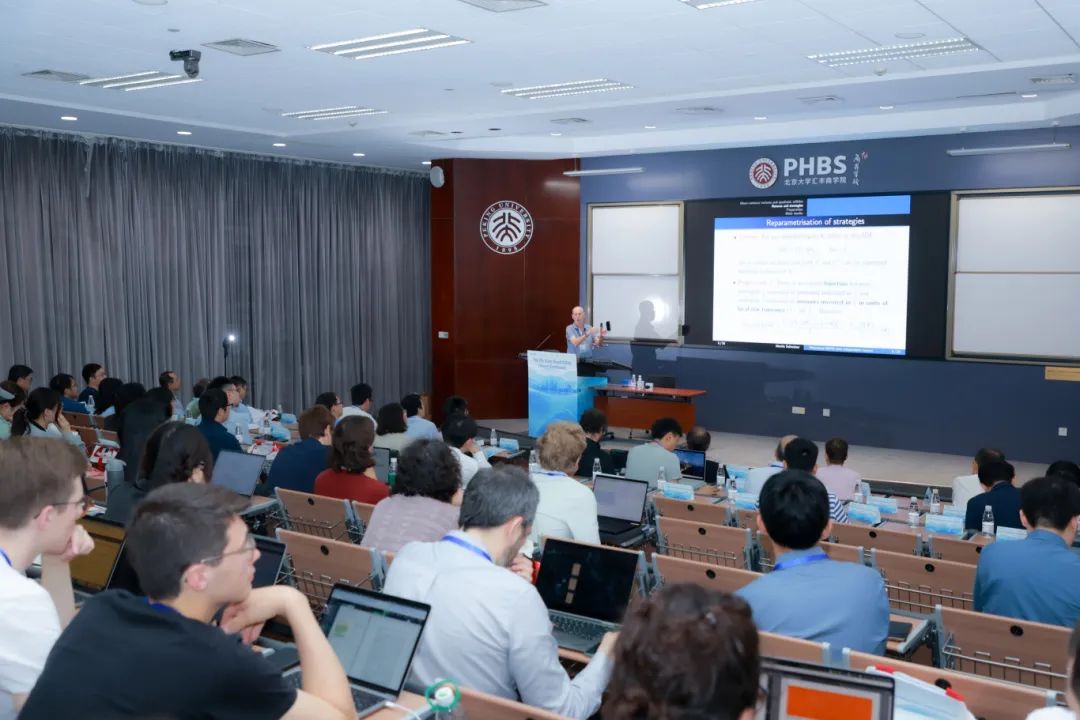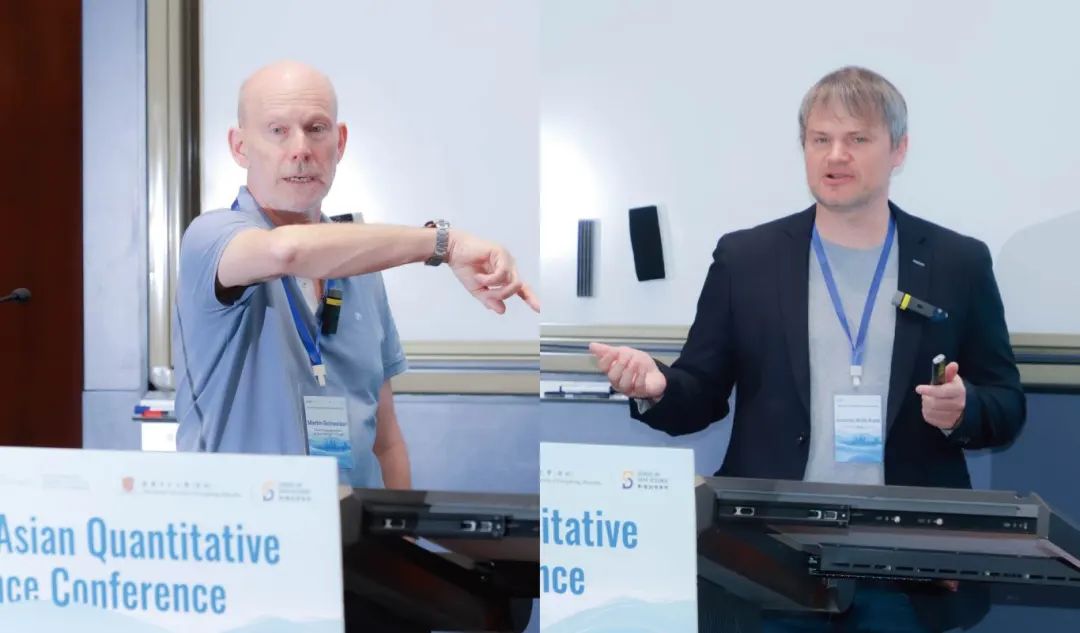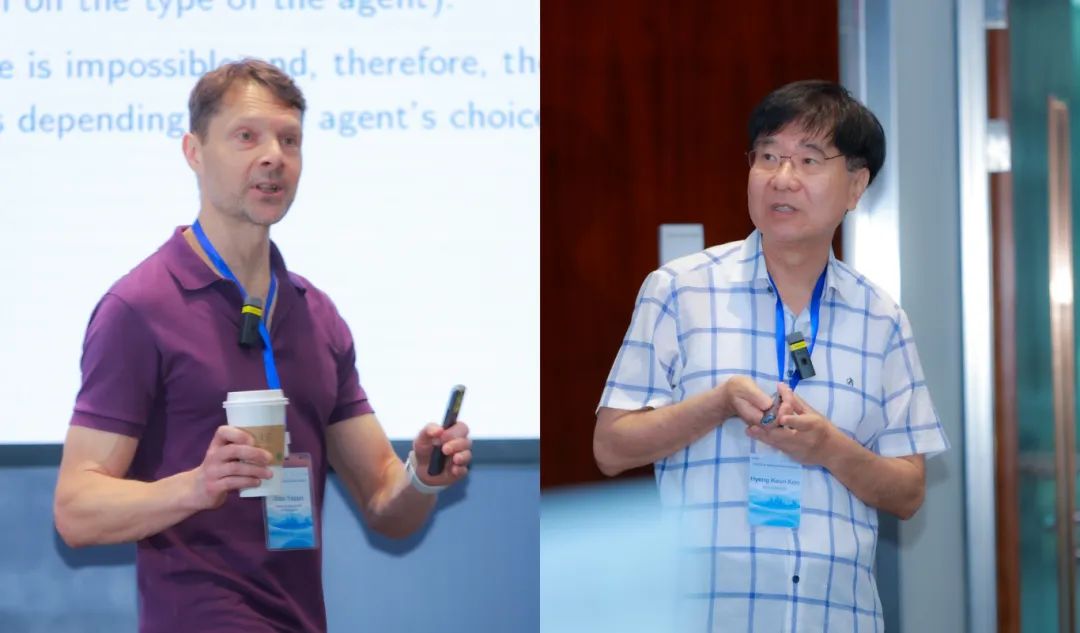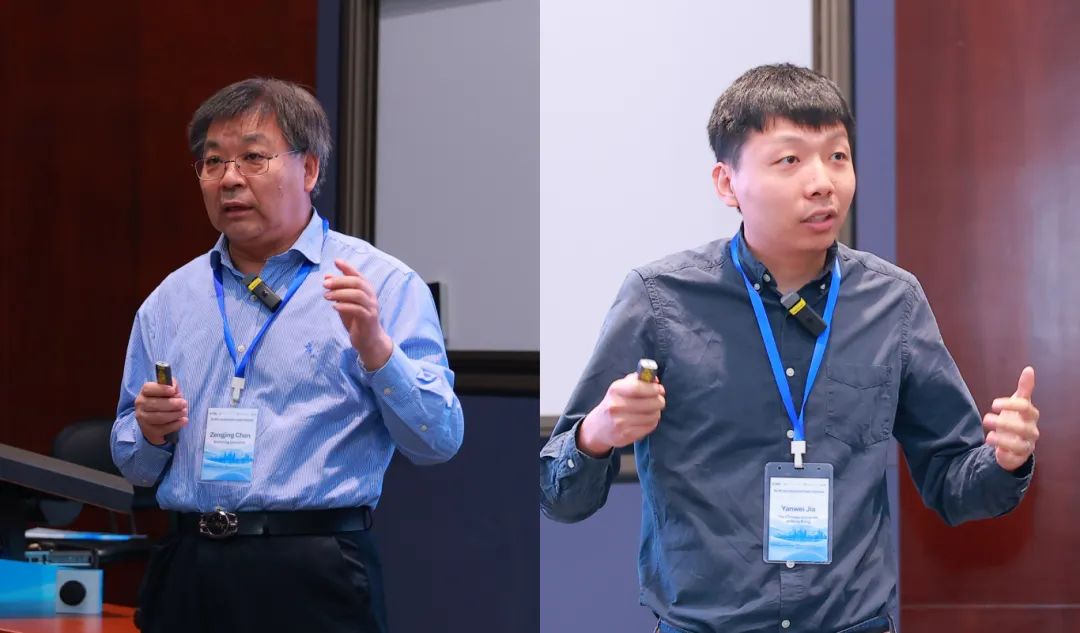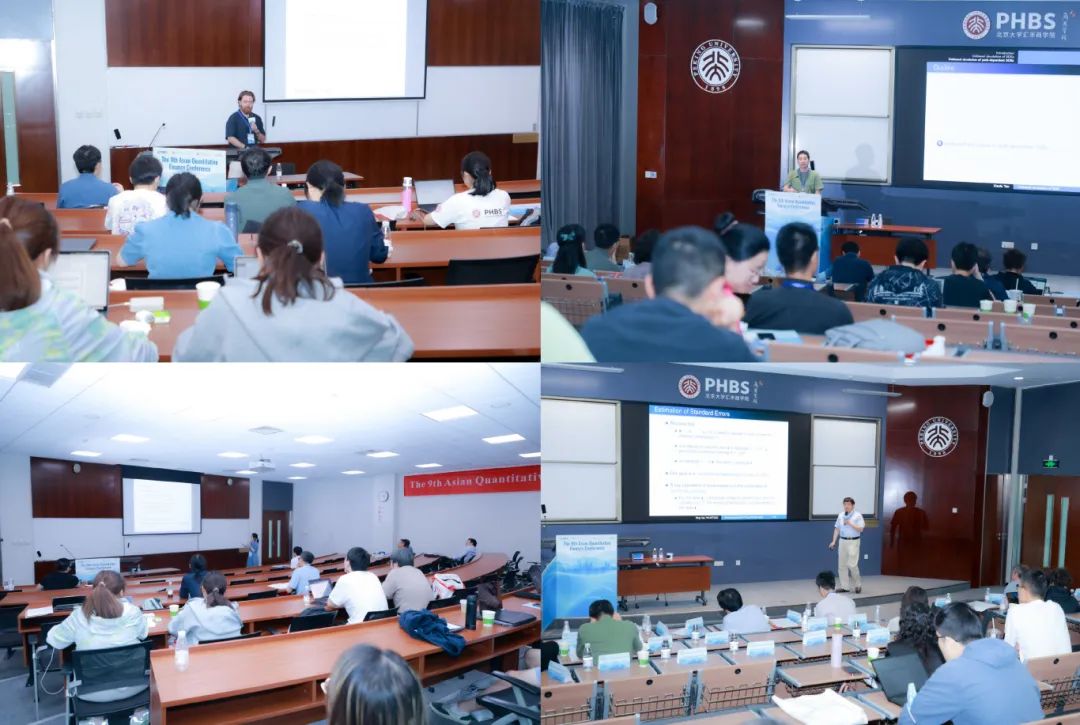Peking University, May 19, 2025: The 9th Asian Quantitative Finance Conference (AQFC) was held from April 26 to 28 at Peking University HSBC Business School (PHBS) in Shenzhen. Jointly organized by PHBS, the Shenzhen Research Institute of The Hong Kong Polytechnic University, and The Chinese University of Hong Kong, Shenzhen, the event brought together more than 180 scholars from leading institutions worldwide. Participants engaged in in-depth discussions on cutting-edge topics in quantitative finance, including financial technology, machine learning, stochastic control, asset pricing, portfolio selection, financial derivatives, financial modeling, and risk management.
Scholars attend the conference
From left to right:Wang Pengfei, Dai Min, Chen Nan, Peng Xianhua
In his welcome address, Wang Pengfei, Boya Distinguished Professor and Dean of PHBS, highlighted China’s rapid development in quantitative finance and emphasized the growing importance of AI-driven innovation in the field. He expressed hope that the conference would foster deeper academic-industry dialogue and breakthroughs in financial innovation.
Dai Min from The Hong Kong Polytechnic University recalled the founding journey of the AQFC and extended his appreciation to the co-organizers. Chen Nan from The Chinese University of Hong Kong extended his best wishes for fruitful academic exchanges throughout the conference.
The opening session was chaired by Peng Xianhua, Associate Professor at PHBS.
Martin Schweizer and Johannes Muhle-Karbe
In the keynote sessions, several internationally renowned scholars shared their latest research findings.
Martin Schweizer, professor at ETH Zurich, presented his paper titled “Dynamic Monotone Mean-Variance Portfolio Optimisation with Independent Returns.” The Monotone Mean-Variance (MMV) utility is a refinement of the classical Markowitz utility, designed to ensure that the utility function is strictly increasing with respect to terminal wealth—thus addressing the non-monotonicity issue in traditional mean-variance analysis. Building on his previous research, Prof. Schweizer provides a complete and explicit solution to the dynamic portfolio optimization problem under the MMV framework, within a semi-martingale asset pricing model where returns are independently distributed. The model assumes only return independence and the absence of local weak arbitrage, making the results broadly applicable to various market settings and offering a robust theoretical foundation for dynamic investment decisions under uncertainty.
Johannes Muhle-Karbe, professor at Imperial College London, presented his research titled “Liquidity and Asset Prices,” which examines how transaction costs affect asset pricing through a general equilibrium model with two representative investors. Solving the model with transaction costs involves complex forward–backward stochastic differential equations, as optimal strategies include endogenous trading boundaries. Given that transaction costs are typically small, Prof. Muhle-Karbe proposes an asymptotic approximation method based on the closed-form solution of the frictionless benchmark case. After calibrating the model with real-world turnover data, he finds that theoretical predictions significantly overstate the impact of transaction costs on asset prices—suggesting that in real markets, only a small fraction (possibly around 10%) of trades are driven by hedging demands. The findings point to a gap between theoretical models and empirical behavior, calling for further research to better understand trading motives in markets.
Jussi Keppo and Hyeng Keun Koo
Professor Jussi Keppo from the National University of Singapore presented his paper titled “Misaligned Clocks: Incentives for Differently Patient Boards and CEOs.” The study builds a principal-agent model to examine how boards with longer time horizons can design compensation contracts that incentivize CEOs—who may have shorter time horizons—to make decisions aligned with the board’s patience level. The research shows that while it is possible to partially align the CEO’s behavior with the board’s preferences through contractual incentives, this alignment is limited by information asymmetry and behavioral constraints. Importantly, the paper highlights a novel mechanism through which changes in the interest rate influence corporate investment behavior—not only via market signals, but also by altering the optimal design of incentive contracts. This sheds light on the role of dynamic contract design in mitigating short-termism and fostering long-term value creation.
Professor Hyeng Keun Koo from Ajou University introduced his paper titled “Optimal Consumption and Portfolio Rules with Dynamic Adjustment of Consumption Bounds.” The study addresses an optimal consumption and investment problem in which investors pre-commit to upper and lower bounds on consumption: the lower bound provides utility as a form of consumption guarantee, while dynamically adjusting these bounds incurs utility loss. To solve this problem, Prof. Koo reformulates it as a dual singular control problem, which is further transformed into an optimal switching problem. He also analyzes the structure of the optimal policy when the utility function is of the CRRA type. The model offers theoretical insights with practical relevance for corporate dividend policies and institutional asset management, where trade-offs between stability and flexibility are critical.
Chen Zengjing and Jia Yanwei
Professor Chen Zengjing from Shandong University presented his research titled “Nonlinear Robust Limit Theorems for a Set of Probability Measures.” In complete markets such as the Black-Scholes model, option prices are given by the discounted expectation of payoffs under a unique risk-neutral measure. However, real-world markets are often incomplete, requiring a family of probability measures to define nonlinear probabilities and expectations. This framework enables robust pricing based on nonlinear expectations of asset returns. Prof. Chen introduces the notion of measure ambiguity, illustrating that a one-armed bandit corresponds to a single probability measure, while a two-armed bandit captures ambiguity through a set of binary Bernoulli models. The paper establishes strong law of large numbers and central limit theorems under such nonlinear settings, where limiting behavior is characterized by Brownian motion or backward stochastic differential equations. These results lay a theoretical foundation for robust asset pricing under model uncertainty.
Assistant Professor Jia Yanwei from The Chinese University of Hong Kong presented the paper titled “Mean–Variance Portfolio Selection by Continuous-Time Reinforcement Learning: Algorithms, Regret Analysis, and Empirical Study.” The study proposes a continuous-time reinforcement learning algorithm for the dynamic mean-variance portfolio selection problem. The algorithm is model-free and data-driven, enabling practical implementation without relying on specific market assumptions. He proves that, under a multi-asset Black-Scholes framework, the algorithm achieves a sublinear upper bound on regret measured by the Sharpe ratio, ensuring its asymptotic efficiency. Empirically, using daily data from S&P 500 constituents over the period 1990–2020, the algorithm demonstrates superior and more robust performance compared to 14 benchmark portfolio optimization methods.
Parallel sessions
In addition to the keynote speeches, the three-day conference featured 27 parallel sessions, covering a wide range of emerging topics such as fintech, machine learning, asset pricing, quantitative investing, corporate finance, derivatives, asset allocation, and stochastic control. Over 100 scholars presented their latest research findings. The 9th AQFC marked another milestone in promoting scholarly exchange and advancing theoretical and practical frontiers in quantitative finance across Asia and beyond.
The group photo of the participants
Since its inception in 2013, the Asian Quantitative Finance Conference has grown into one of the most influential annual academic gatherings in the field. Previous conferences have been hosted by institutions such as the National University of Singapore, Shandong University, The Chinese University of Hong Kong, Osaka University, KAIST, Sun Yat-sen University, the Vietnam Institute for Advanced Study in Mathematics, and Taipei University of Technology.
Written by: Wu Yixing,Xia Xinyu,Zha Jiajing,Yan Xihe,Wu Yi,Jiang An
Source:PHBS Research Office and Public Relations & Media Office (Chinese)
